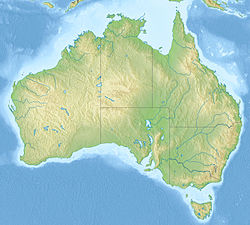Walloon Coal Measures
 From Wikipedia the free encyclopedia
From Wikipedia the free encyclopedia
| Walloon Coal Measures | |
|---|---|
| Stratigraphic range: Oxfordian-early Tithonian ~ | |
| Type | Subgroup |
| Unit of | Injune Creek Group |
| Sub-units | Juandah Coal Measures, Maclean Sandstone Member, Tangalooma Sandstone, Taroom Coal Measures, Mutdapilly fossil locality |
| Underlies | Springbok Sandstone |
| Overlies | Hutton Sandstone, Eurombah Formation |
| Thickness | 420–700 m (1,380–2,300 ft) |
| Lithology | |
| Primary | Shale, sandstone, siltstone |
| Other | Coal, limestone |
| Location | |
| Coordinates | 27°00′S 152°36′E / 27.0°S 152.6°E |
| Approximate paleocoordinates | 67°12′S 93°18′E / 67.2°S 93.3°E |
| Region | |
| Country | |
| Extent | Surat & Clarence-Moreton Basins |
| Type section | |
| Named for | Walloon |
| Named by | Dudgeon |
| Year defined | 1982 |
The Walloon Coal Measures are a Late Jurassic geologic subgroup in Queensland, Australia. Deposited within the Surat Basin, it is considered Oxfordian to early Tithonian in age based on lead-uranium dating of tuffites within the unit.[1]
Description
[edit]The 420 to 700 metres (1,380 to 2,300 ft) thick formation comprises thin-bedded, claystones, shales, siltstones, lithic and sublithic to feldspathic arenites, coal seams and partings and minor limestone. The formation is laterally equivalent to the Mulgildie Coal Measures and Birkhead Formation.[2]
Fossil content
[edit]The formation, in the Jurassic in the South Polar region, has provided fossil flora and trace fossils of theropods, ornithopods and Changpeipus bartholomaii and Garbina roeorum.[3][4] The dinosaur Rhoetosaurus is known from the unit.[1] 11 tracks are known from the formation, mostly those of large (prints 30-75 centimetres in length) theropods.[5]
References
[edit]- ^ a b Todd, Christopher N.; Roberts, Eric M.; Knutsen, Espen M.; Rozefelds, Andrew C.; Huang, Hui-Qing; Spandler, Carl (December 2019). "Refined age and geological context of two of Australia's most important Jurassic vertebrate taxa (Rhoetosaurus brownei and Siderops kehli), Queensland". Gondwana Research. 76: 19–25. Bibcode:2019GondR..76...19T. doi:10.1016/j.gr.2019.05.008. S2CID 199105458.
- ^ Walloon Coal Measures - Australian Stratigraphic Units Database
- ^ Westvale No. 5 Colliery at Fossilworks.org
- ^ Balgowan Colliery, Darling Downs at Fossilworks.org
- ^ Romilio, Anthony; Salisbury, Steven W.; Jannel, Andréas (2020-06-12). "Footprints of large theropod dinosaurs in the Middle–UpperJurassic (lower Callovian–lower Tithonian) Walloon Coal Measures of southern Queensland, Australia". Historical Biology. 33 (10): 2135–2146. doi:10.1080/08912963.2020.1772252. ISSN 0891-2963. S2CID 225692077.
Further reading
[edit]- L. C. Ball. 1933. Fossil footprints. Queensland Government Mining Journal 34(403):384
- A. Bartholomai. 1966. Fossil footprints in Queensland. Australian Natural History 15:147-150
- J. B. Cameron. 1970. The Rosewood-Walloon coalfield. Geological Survey of Queensland Publication 344:1-42
- Dudgeon, M.J., 1982, Stratigraphy and palaeobotany of east and west Haldon, Main Range, southeast Queensland., University of Queensland Department of Geology. Papers, 10(2), p83-110
- Green, P.M., Carmichael, D.C., Brain, T.J., Murray, C.G., McKellar, J.L., Beeston, J.W., Gray, A.R.G., 1997, Lithostratigraphic units in the Bowen and Surat Basins, Queensland IN: Green, P.M. (ed.) "The Surat and Bowen Basins, south-east Queensland", Queensland Minerals and Energy Review Series, Queensland Geological Survey, 1v, p41-108
- T. H. Rich and P. Vickers-Rich. 2003. A Century of Australian Dinosaurs. Queen Victoria Museum and Art Gallery and Monash Science Centre, Monash University 1-124
- J. F. Rigby. 1978. Jurassic plant fossils from the Walloon Coal Measures at Rosewood Consolidated Colliery. Queensland Government Mining Journal 526-529
- Wells, A.T., O'Brien, P.E., 1994, Lithostratigraphic framework of the Clarence-Moreton Basin IN Wells, A.T. and O'Brien, P.E. (eds.) "Geology and Petroleum Potential of the Clarence-Moreton Basin, New South Wales and Queensland", Australian Geological Survey Organisation. Bulletin, 241, p4-47
